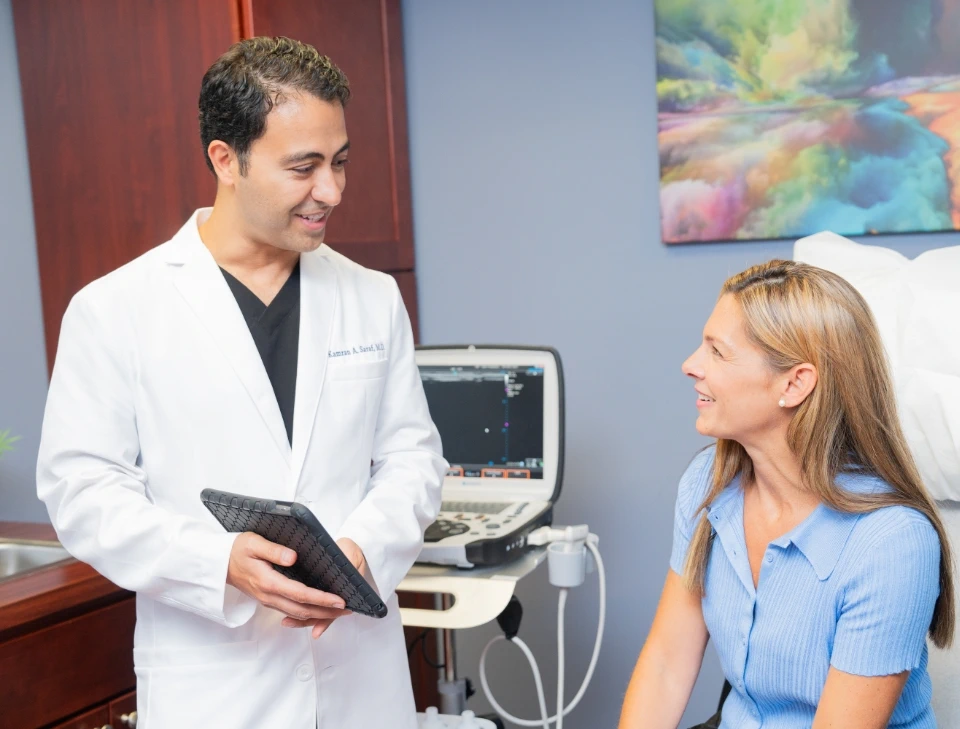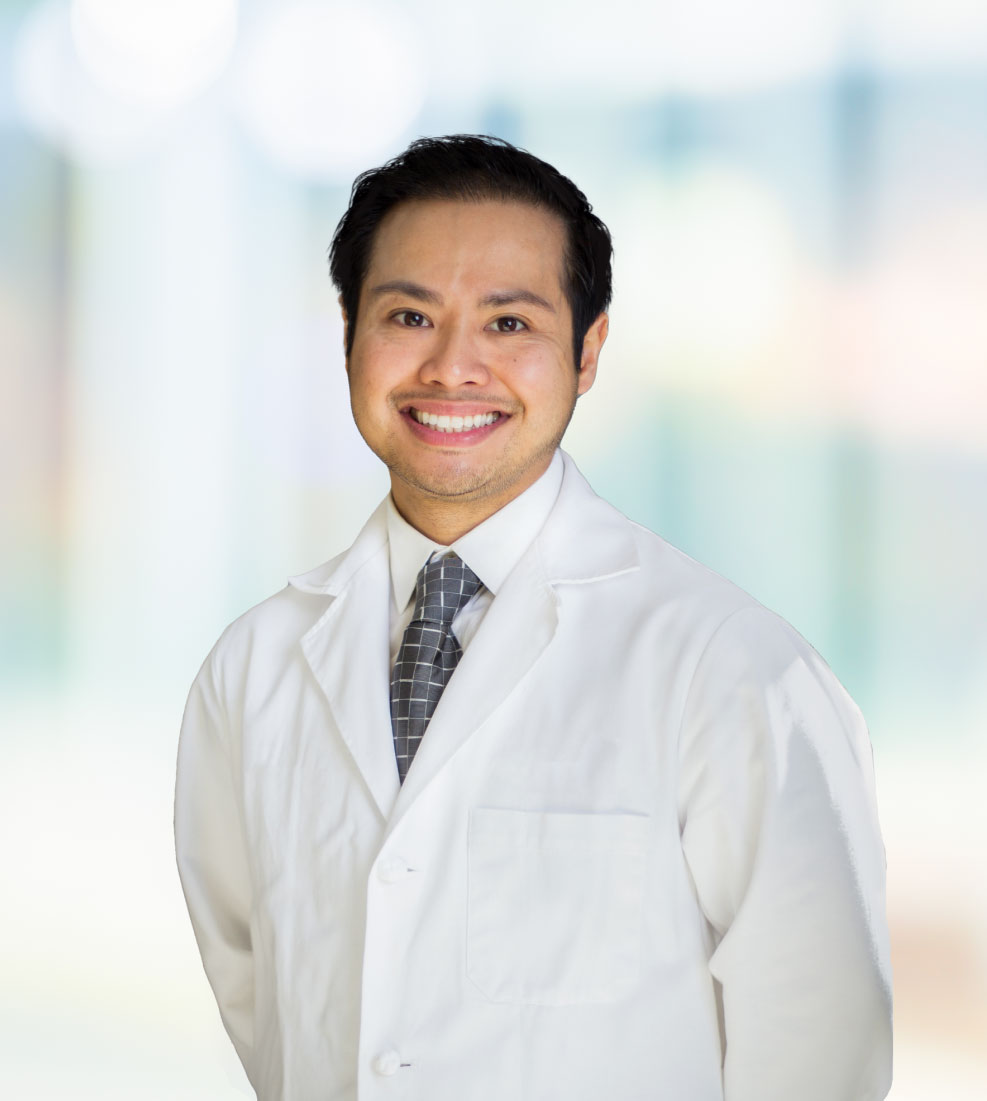Find the Top Vein Doctor in NJ at Our Premier Medical Center
You have varicose veins and spider veins. You’ve frequently been searching for the phrase ‘vein center near me’. Well, if you live in New Jersey, getting your veins treated is extremely easy. The Vein Treatment Clinic, New Jersey has two highly experienced vein specialists who are very skilled, and have had great outcomes in treating vein disease.
Meet two of the top vein doctors in NJ at the Vein Treatment Clinic
Our vein doctors operate out of two key locations in Northern New Jersey – Clifton and Paramus.

Top Vein Doctor at our vein center in Clifton, NJ
Dr. Sareh Rajaee, our vein doctor at Clifton, is a board-certified vascular surgeon who trained at Yale University. Dr. Rajaee is highly experienced in diagnosing and treating all types of vein and arterial disease. A highly compassionate vein doctor, Dr. Rajaee is deeply involved in patient advocacy, health and human rights. Our Clifton vein treatment center is located very near a Ford dealership on Route 46-E.
Top Vein Doctor at our vein treatment center in Paramus, NJ
At Our Paramus vein clinic, you will consult with Dr. Todd Kobrinski. Dr. Kobrinski is a double board-certified physician, with expertise in internal medicine as well as cardiovascular disease. His strong belief in the patient-centric approach, combined with his years of expertise allows him to deliver highly successful treatment outcomes. The Vein Institute in Paramus is located just off the Garden State Parkway, near the Paramus Park Mall.

What causes varicose veins and spider veins?
Varicose veins and spider veins are both caused by the same underlying condition – chronic venous sufficiency. Chronic venous sufficiency (CVS) is a condition in which a major vein in the leg, called the saphenous vein, is damaged. This vein has a difficult job – it transports blood from the legs all the way up to the heart, against gravity. To prevent the blood from falling back down into the legs, the saphenous vein has one-way valves, which seal shut as blood flows past.
In CVS, these valves are damaged. This causes blood to trickle down into the legs, and accumulate there. This causes the pressure in the smaller leg veins to build up. The slightly larger veins distort and bulge out, leading to the formation of varicose veins. The smaller veins are damaged under pressure, and form blue or purple streaks under the skin, called spider veins.
Merely treating the visible varicose and spider veins will not make the pressure in the legs go away, and new ones can form. To avoid recurrence, therefore, the root cause – CVS – must be addressed.
A word from our Vein doctor in Bergen County: why your varicose veins need treatment
For some people, varicose veins may appear to be asymptomatic, and you may not be overly concerned about their appearance. Do you still need to get them treated? Yes, answer vein experts, for two main reasons:
Varicose vein treatment prevents dangerous complications
In CVS, stagnation of blood over time can cause the vein to swell up. The vein wall and the skin over it stretch and become thinned out and fragile. This is a dangerous situation which can result in one of the following complications:
- Bleeding: Bumping or grazing the fragile skin that lies over the defective vein can injure it, and cause the vein to rupture. This can lead to profuse bleeding that you will not be able to control by yourself, necessitating an emergency room visit.
- Venous ulcers: The stagnant blood prevents essential nutrients from reaching the skin, causing it to lose its regenerating quality. As a result, even minor scratches to the skin can turn into troublesome, non-healing venous ulcers.
- Deep vein thrombosis: The stagnated blood has a tendency to clot. Blood clots can travel to the deep veins of the le, and, from there, can even break off and travel to the heart and lungs, blocking off blood supply to these critical areas. This condition, called pulmonary embolism, is extremely dangerous and can even be fatal.
Treatment for varicose veins can heal overlying skin conditions
The stagnant blood in varicose veins can leak out of the vessels into the surrounding tissues, and break down into various toxins. These toxins deposit beneath the skin and subcutaneous tissues, and can case irritation, leading to uncomfortable skin conditions. These include:
- Eczema: This condition is similar to an allergic reaction, and is associated with red flare-ups, and scaly and itchy skin.
- Lipodermatosclerosis: The deposits affect the subcutaneous tissues just beneath the skin. These tissues become stiff and hard, and can even distort the shape of the leg.
To avoid these complications, and improve your quality of life, seek out a vein doctor in NJ as soon as possible! At the Vein Treatment Clinic, you can conveniently do this online.
To learn more about our team of accomplished vein doctors, please visit https://www.veintreatmentclinic.com/vein-doctor. Our physicians are board-certified vein experts, with compassionate bedside manner and impressive resumes. Most of our vein doctors trained at Ivy-league schools, and our harvard-trained medical directors hand picked each physician. We collaborate frequently across all locations to make sure each patient receives the highest standard of care. Visit our partner websites to learn about our vein specialists in New York, Long Island, New Jersey, Texas and California.
Book a Consultation
Scheduling a consultation with one of our vein treatment experts is one of the best ways to determine the proper resolution for your varicose veins. The treatments can include sclerotherapy, laser or radiofrequency ablation, a medication called Varithena, or procedures such as Venaseal, or Clarivein.
Dr. Andrew Cortes
Vein Doctor New Jersey
SUNY Downstate Medical Center
Dr. Sahil Patel
Vein Doctor New Jersey
Rutgers University
Dr. Billy Schoenfeld
Vein Doctor San Diego
Harvard University
Dr. Juan Montoya
Vein Doctor New York
Yale University
Dr. Carly Guthrie
Vein Doctor San Diego
Harvard University
Dr. Shane Volney
Vein Doctor New York
Harvard University
Dr. Laura Lombardi
Vein Doctor New York
Harvard University
Dr. Kamran Saraf
Vein Doctor Maryland
University of Miami
Dr. Sareh Rajaee
Vein Doctor New York
Yale Medical School
Dr. Zalekha Shair
Vein Doctor Long Island
New York Medical College
Dr. Todd Kobrinski
Vein Doctor New Jersey
George Washington University
Dr. Walter Lech
Vein Doctor San Jose
Harvard University
Dr. Jeffrey Deygoo
Vein Doctor New Jersey
George Washington University
Dr. Thomas Arnold
Vein Doctor Long Island
University of Pennsylvania
Dr. Lisa Alford
Vein Doctor Maryland
McGill University
Dr. Jasmine Koo
Vein Doctor San Diego
University of Washington
Dr. Michael Nguyen
Vein Doctor
Harvard University
Dr. Caroline Novak
Vein Doctor
Northwestern University
Dr. Sahar Amery
Vein Doctor New Jersey
Stony Brook University Hospital
Dr. Kimberly McFarland
Vein Doctor California
SUNY Downstate Medical Center
We know health insurance is confusing so we will help you check if you’re covered:
FREE Coverage Checker:
By emailing or contacting us, you are accepting the inherent privacy limitations of online communication. For more information, please read our Digital Communications document. Please respond "STOP" to any text messages to opt out.








